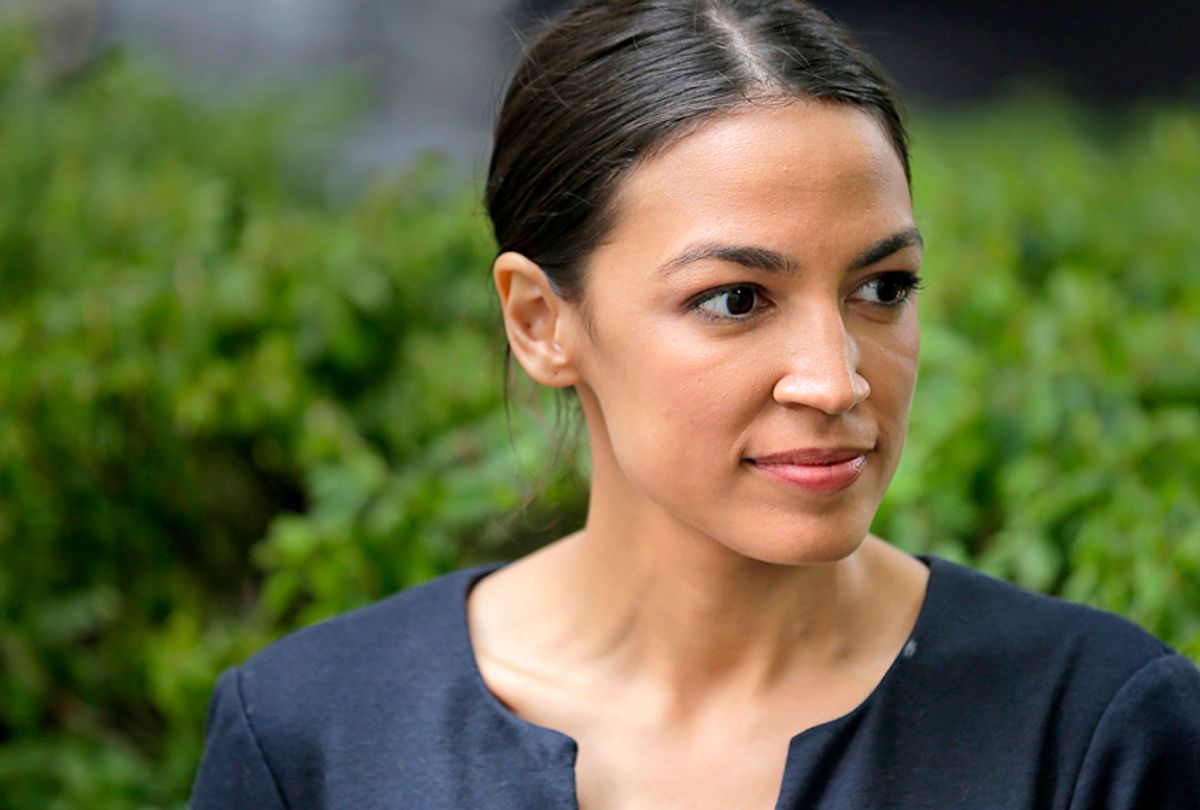Ainsley Earhardt, the co-host of President Donald Trump's favorite morning show falsely claimed to New York Post columnist Michael Goodwin and her "Fox & Friends" viewers that newly-elected Rep. Alexandria Ocasio-Cortez (D-N.Y.), the youngest woman ever elected to the U.S. Congress, wants to "tax 70 percent of your paycheck."
Monday, on "Fox & Friends," Earhardt asked Goodwin why he thinks Ocasio-Cortez has such wide support within the Democratic Party. "When you hear they're going to tax 70 percent of your paycheck – if Alexandria Ocasio-Cortez gets her way – how do they have so much support?" she asked Goodwin.
Goodwin responded by saying that "young people today are not being educated properly in schools" and "don’t know the history of our country." "They don't know the history of other countries," he added. "They don't understand economics."
"She's charming and delightful in many ways," Goodwin said of Ocasio-Cortez. "She got an economics degree from Boston University, and she clearly doesn’t understand how the unemployment rate works. She said that it's low, because so many people have two jobs. Now, how do you get an economics degree from a major college and not understand that that’s not how the unemployment rate works? How is that possible?"
However, Ocasio-Cortez did not propose taking 70 percent on the average American's income. In an interview with Anderson Cooper, which aired last week on "60 Minutes," the freshman congresswoman argued that high tax rates on the super-rich could help fund the "Green New Deal" — an ambitious plan to combat the threat of climate change.
The 29-year-old Democratic socialist said the "Green New Deal," which aims to eliminate carbon emissions within 12 years, is "going to require a lot of rapid change that we don't even conceive as possible right now."
"What is the problem with trying to push our technological capacities to the furthest extent possible?" Ocasio-Cortez asked.
To pay for the deal, Ocasio-Cortez pointed to the progressive tax rate system in the 1960s, proposing the idea of tax of tax rates as high as 70 percent on the super-rich.
"You know, you look at our tax rates back in the '60s. And when you have a progressive tax rate system, your tax rate . . . let's say, from zero to $75,000, may be ten percent or 15 percent, et cetera," Ocasio-Cortez said. "But once you get to, like, the tippy tops, on your ten-millionth dollar, sometimes you see tax rates as high as 60 or 70 percent."
"That doesn't mean all $10 million are taxed at an extremely high rate," she clarified. "But it means that, as you climb up this ladder, you should be contributing more."
Cooper asked if she was proposing a "radical agenda, compared to the way politics is done right now."
"I think that it only has ever been radicals that have changed this country," Ocasio-Cortez replied. "Abraham Lincoln made the radical decision to sign the Emancipation Proclamation. Franklin Delano Roosevelt made the radical decision to embark on establishing programs like Social Security. That is radical."
Asked if she calls herself a "radical," Ocasio-Cortez said, "If that's what radical means, call me a radical."
In another part of the interview, Cooper asked Ocasio-Cortez about her Democratic socialist convictions: "When people hear the word socialism, they think Soviet Union, Cuba, Venezuela. Is that what you have in mind?"
"Of course not. What we have in mind — and what of my — and my policies most closely resemble what we see in the U.K., in Norway, in Finland, in Sweden," Ocasio-Cortez replied.
Ocasio-Cortez's socialist policies also came under scrutiny Monday on FoxNews.com, where the conservative writer Michael Knowles called the freshman congresswoman "frequently-wrong but never-in-doubt" in an opinion piece titled, "Alexandria Ocasio-Cortez, the voice of an ignorant generation."
Joseph Lieberman, a former Democratic vice presidential candidate and Connecticut senator (first Democratic then independent) who wrote a Wall Street Journal editorial criticizing Ocasio-Cortez last month, told Salon's Matthew Rozsa why the antipathy toward Ocasio-Cortez from the right is so strong.
"She challenges a lot of policy assumptions that are held dear on the right in American politics, including the market economy, the limits on government spending, involvement in internationalist foreign policy including support for Israel," Lieberman said. He added that "the other thing going on" is how Republicans seem to believe that "the publicity she's getting is ultimately a vulnerability for the Democratic Party in the midterm elections . . . if she can be made the face of the Democratic Party."
Ocasio-Cortez has emerged as a national firebrand, in the process capturing the attention of Americans of all political stripes. She was sworn into the House of Representatives, as Democrats reclaimed control of the lower chamber. During the Democratic primary in June, the political novice unseated incumbent Rep. Joe Crowley, who at the time was the fourth highest-ranking Democrat in the House. Ocasio-Cortez is a self-identified Democratic Socialist and supports universal health care, tuition-free public universities and criminal justice reform.



Shares